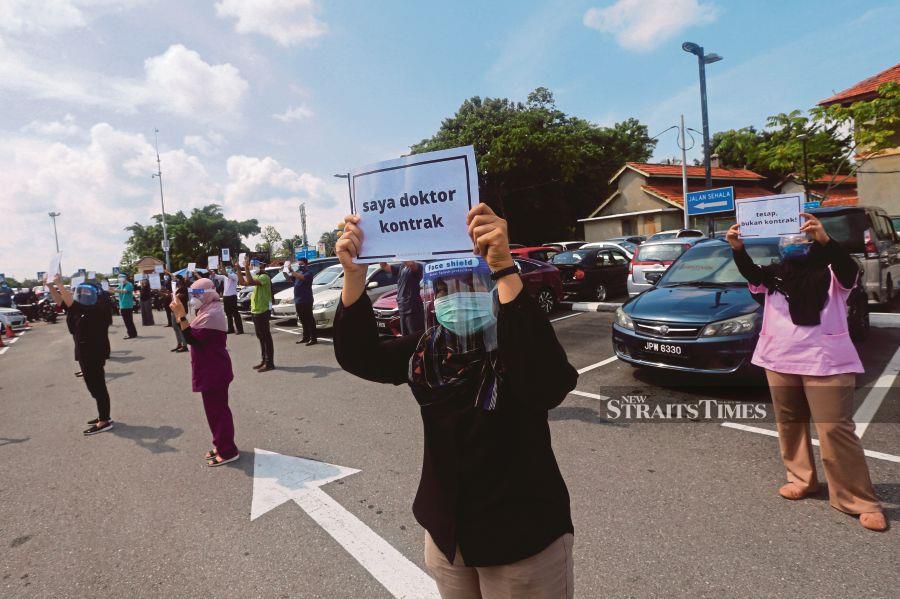
KUALA LUMPUR: The medical fraternity has advised contract doctors to agree with the government's short-term measures while a holistic long-term plan is drawn up to resolve their predicament.
Malaysian Medical Association president Datuk Dr Subramaniam Muniandy said the government's decision to offer a two-year contract extension to medical officers, dental officers and pharmacists was in line with its earlier proposal.
The association, he said, had proposed two short-term solutions and one long-term measure through a working paper to the Health Ministry and the Public Service Department in 2018.
"For an immediate solution, we suggested that all contract doctors be given the right to apply for fully paid study leave and to be able to receive the Federal Scholarship to pursue specialist training.
"We also suggested either the absorption in permanent positions with only Employees Provident Fund as an option, failing which we proposed an extended contract of 10 years after the completion of compulsory service.
"The long-term solution was to reduce the number of recognised medical schools in the Second Schedule of the Malaysian Qualifications Agency and to reduce the number of medical colleges in the country (where the ratio of medical schools to population is above that of the United Kingdom and Australia).
"We have also supported the continued moratorium on the formation of new medical schools, as well as controlling the intakes of all private medical colleges in the country," he told the New Straits Times.
The country, he said, was supplied with an average of 5,000 new graduates from local and overseas medical schools yearly.
The ministry attempts to absorb 1,000 new housemen every two to three months to ensure that the waiting time for housemanship is reduced to about six months.
Dr Subramaniam pointed out that the nationwide walkout on Monday was primarily driven by the issue of unequal pay between contract and permanent medical officers.
"The previous inequality in pay and perks faced by the contract officers was only addressed in passing.
"Although they did receive the much-delayed promotion earlier this year, the sentiment of being treated unfairly has been allowed to fester.
"Despite the recent announcement by Prime Minister Tan Sri Muhyiddin Yassin to extend their contracts and equalise the perks, the contract doctors have lost faith in the government's efforts and are requesting for the immediate absorption as permanent staff of the civil service.
"Their demands are not unwarranted. They have served the country when called upon and are essential to the war against Covid-19.
"However, absorbing the 25,000 contract doctors over the next few years would entail a massive expenditure on the healthcare budget, leaving little for infrastructure development and other purchases.
"While we empathise with contract doctors, the short-term solution is what the government offers at the moment while working to increase permanent positions in the long term."
Dr Darien Liew Daojuin from Malaysian Medics International said the contract system was introduced in 2016 as a temporary measure to resolve the backlog of medical graduates waiting for housemanship and to ease the financial burden in employing permanent doctors.
"With more than 5,000 medical graduates entering the workforce, the waiting time was set to nine to 12 months or perhaps longer. It was meant as a temporary measure.
"However, there were no clear directives in terms of contract renewal and progression pathways, which created a host of other issues.
"It was clear that there was no job security as contract doctors were not entitled to Program Hadiah Latihan Persekutuan (which is essentially a federal scholarship to pursue the local masters' programme).
"The uncertainties in contract renewal also meant that there were no guaranteed placements to work, which restricted contract doctors from pursuing parallel pathway exams.
"Contract medical officers (MOs) are also not entitled to hazard leave, unrecorded leave and maternity leave. There is also a huge salary difference between contract and permanent MOs due to the difference in their pay grades."
Severe understaffing in hospitals due to the Covid-19 pandemic, he said, fuelled discontent among contract doctors and triggered the Hartal Doktor Kontrak movement.
"When a healthcare worker has to don full personal protective equipment every day for at least 12 hours a day, the heat, dehydration and exhaustion put them in a different mental state.
"Furthermore, the current contract MOs were nearing the end of their contract prior to the government's recent announcement of contract extension.
"Job insecurity, unfairness, severe understaffing, lack of resources and, of course, better opportunities, have enabled the current series of events to take place."
Although the recently announced contract extension ensured the opportunity to specialise, Dr Liew said, the government had not released any fine print on the matter.
"We can only hope that more healthcare workers are employed soon to alleviate the patient load in our hospitals.
"There is no point in building temporary facilities to aid in this pandemic without sufficient staff to man it."
Resolving the contract doctors' predicament, he added, would encourage and motivate healthcare workers to continue serving the people, especially with an unforgiving pandemic ravaging the nation. - NST



No comments:
Post a Comment
Note: Only a member of this blog may post a comment.